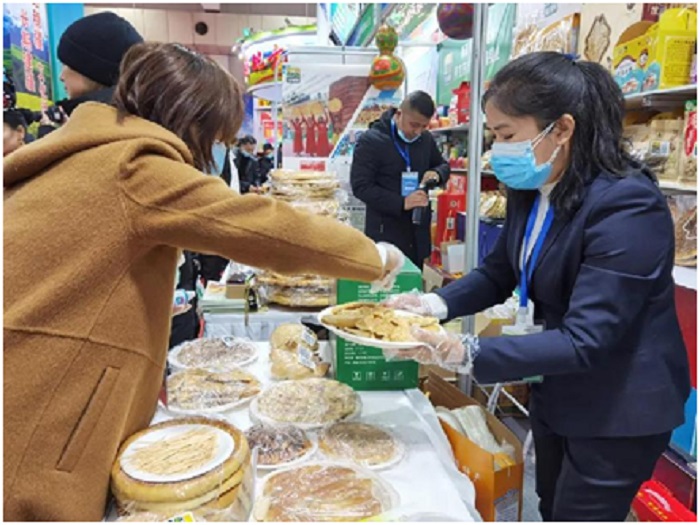



“Thanks to the officials from Henan province, all my Hami melons were sold out. I’m really grateful to them,” Wang Denghao, a farmer in Hongshan village, Nanhu township, Hami, northwest China’s Xinjiang Uygur autonomous region, told People’s Daily joyfully, adding that he plans to continue growing Hami melons in the next year.
Nanhu township has a Hami melon planting area of 14,500 mu (about 966.67 hectares), and produces about 30,000 tons of Hami melons a year. Last year, nearly 4,000 tons of these fruit were sold to central China’s Henan province, which has been helping promote sales of products from Xinjiang through China’s “pairing assistance” program designed to channel financial and personnel support to less developed regions.
Zhao Hongyuan, deputy head of Hami melon association of Nanhu township, considered the pairing assistance from Henan really helpful. “The province has carried out promotional activities both online and offline to help us sell products and we don’t need to worry about the sale of our Hami melons at all,” Zhao said.
Besides Nanhu township, other areas of Xinjiang have also benefited from the pairing assistance from Henan.
The 13th division of the Xinjiang Production and Construction Corps in Hami city sold 4,793 tons of high-quality grapes and more than 20,000 tons of late-maturing organic Hami melons to Henan province last year.
Due to the outbreak of the COVID-19 pandemic, agricultural and sideline products of Hami city encountered poor sales for a time last year, which added pressure on local people for shaking off poverty as planned.
The problem became worse during the harvest season when a large number of fruits appeared on the market at the same time, which made growers extremely anxious.
In June 2020, members from Henan province for pairing assistance in Xinjiang carried out studies and surveys in the fields and mobilized all the officials dispatched to Xinjiang in tackling the challenges posed by the pandemic to fruit growers.
“We should try to sell more Hami melons to Henan and other areas,” said Guo Zhiyong, deputy director of the bureau of agriculture and rural affairs of Hami and one of the 10th batch of officials sent from Henan province to Xinjiang under the “pairing assistance” program.
In early July 2020, the forward command post of Henan province for pairing assistance in Xinjiang cooperated closely with Communist Party of China (CPC) Hami municipal committee and the municipal government, launching a live-streaming event for stimulating the consumption of products from Xinjiang in Henan province.
Relevant enterprises running businesses such as shopping malls, supermarkets, and wholesale markets in Henan province were all encouraged to promote products from Xinjiang via livestreaming during the event.
In addition, by tapping into various resources and advantages, officials sent from Henan to Xinjiang brought in an amount of orders in a short time. They were frequently seen helping purchase fruits in the fields and send out goods.
“I perform comic dialogues and dramas. I never thought I could one day be a part of a livestreaming show,” said Fan Jun, a traditional Chinese opera master in Henan. In response to the province’s call for support for Xinjiang’s development, Fan has volunteered to perform in Xinjiang every year during the past nearly 10 years.
In December 2020, the forward command post of Henan province for pairing assistance in Xinjiang held the third nang industry promotion conference in Zhengzhou, capital of Henan province, in cooperation with the Department of Agriculture and Rural Affairs of Xinjiang.
More than 200 types of nang, a baked flatbread and staple food for the Uygur ethnic group, and over 100 kinds of special forest and fruit products as well as agricultural and sideline products from Xinjiang were showcased at the event, which resulted in investment and cooperation agreements worth of 970 million yuan (about $149.77 million) between Xinjiang and large shopping malls, supermarkets, and dealers in Henan.
Last year, the forward command post of Henan province for pairing assistance in Xinjiang helped Hami city sell 53,455 tons of agricultural and sideline products, effectively increasing the production and income of local residents.


The Executive and members of the.


The Acting Director, FCT Directorate of.


President Bola Ahmed Tinubu has been.



Barely a month after resignation of.


An Abuja based Legal Practitioner, Osuagwu.



Convener of Equitable Remedy, Mrs. Magaret.


Contractors handling the contract for city.


Nigerian government may have concluded plans.


The Diplomatic Correspondents Association of Nigeria.


A rights group, “Follow Me Talk.
Leave a Comment